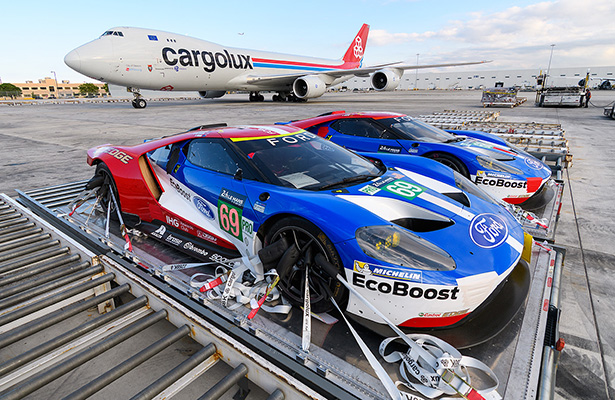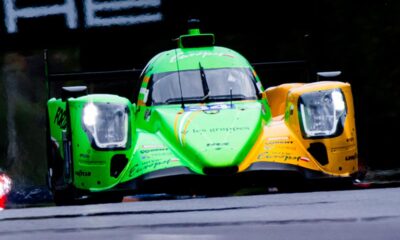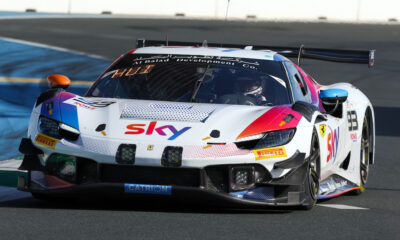
Photo: Ford Chip Ganassi Racing
Ford Chip Ganassi Racing IMSA team manager Mel Harder says they’re better prepared for this year’s 24 Hours of Le Mans, with a deeper understanding of the logistics and challenges involved in taking the American team overseas.
The Indianapolis-based organization made its Le Mans debut in 2016, claiming GTE-Pro class honors with Joey Hand, Dirk Mueller and Sebastien Bourdais, who were cast in the spotlight in the 50th anniversary of Ford’s first win in the French endurance classic.
However, the four-car operation, which pooled resources from both its IMSA WeatherTech SportsCar Championship and FIA World Endurance Championship programs, proved to be an intense logistical exercise, according to Harder, who along with fellow team manager Mike O’Gara, oversees the U.S. team’s operations.
Harder said the knowledge and experience from its maiden trip twelve months ago has “gone a long way” in returning to France with a much better mindset of what to expect.
“Last year, it was like we were packing for a camping trip and we were just taking everything that we could from home,” he told Sportscar365.
“This year, we’re a lot more organized in how we shipped it, and consequently our set up here has gone a lot quicker and is a lot more efficient.”
Preparation began months ago, when a 60 cubic meter-sized container containing equipment, spares and a backup Ford GT chassis, was sea-freighted to Europe, joining another container it left in the UK following last year’s race with Le Mans-specific items.
Its two Multimatic-built cars and 29 pieces of spares and equipment, meanwhile, were air-freighted from Chicago to London on May 23 (pictured above) and trucked down to Le Mans on four curtain-sided trailers from the UK for the test day earlier this month, where the team unpacked the nearly 13 tons of equipment.
While having its UK-based counterparts to lean on, Harder said there are various challenges of racing in Europe that they had to quickly come to grips with last year.
“Everyone’s adapting very well to it,” Harder said. “Power last year was kind of comical because we were Googling things to try and figure out how to convert power!
“But now that we’ve been through it, everyone knows exactly where everything goes.
“Last year we borrowed some things from Riley and it was nice to have just a basket of things that we could use in an emergency, but now we’ve got our own and the right stuff.
“We’ve made harnesses and cords to power it all up, so we’re in good shape.”
Its interaction with the WEC team, which runs under the same FCGR banner, has also been a “tremendous difference” year-to-year.
The FCGR crew, which arrived in France on June 1, were greeted to their transporter, awning and engineering stations already set up at the track by their UK counterparts.
Harder said they’ve been able to build a stronger bond with members of the WEC crew, particularly when a number of them came over to assist the U.S. team in FCGR’s four-car effort in the Rolex 24 at Daytona and three cars at the Twelve Hours of Sebring in March.
“This was the first race that we ran together last year, and there were a lot of new faces, and everybody trying to understand each other,” Harder said.
“We ran here last year, we ran Daytona, we ran Sebring, so I think there’s a real camaraderie and we’ve been working well together. “They helped us out a great deal here, and we’ve done a lot for them other the winter when they were running cars at Daytona and Sebring.
“It’s gone a long way and it’s helped us when we showed up and everything was pretty much ready to go for us.”
While facing many logistical hurdles at times in racing overseas, Harder said the biggest challenge is amount of time the crew is away from home, with its 24 full-time staff in France for 20 days.
An additional ten crew members, as well as the six drivers for its Nos. 68 and 69 Fords, will arrive on Sunday.
“You’re here for three weeks, and it’s a long time for people to be away from their families and all the work is really heavily loaded to the end of the event,” Harder said.
“So I think just having the right setup, making sure the housing goes right, and the cars are big enough to haul the luggage and the people, and that they’re fed well.
“The things they’re used to at home, like a nice bed to sleep in. We’ve been able to rent houses and their families treat us like we are part of the family.
“I think all that went a long way to make it a good experience for the guys last year, and they were actually looking forward to coming back this year.”

























